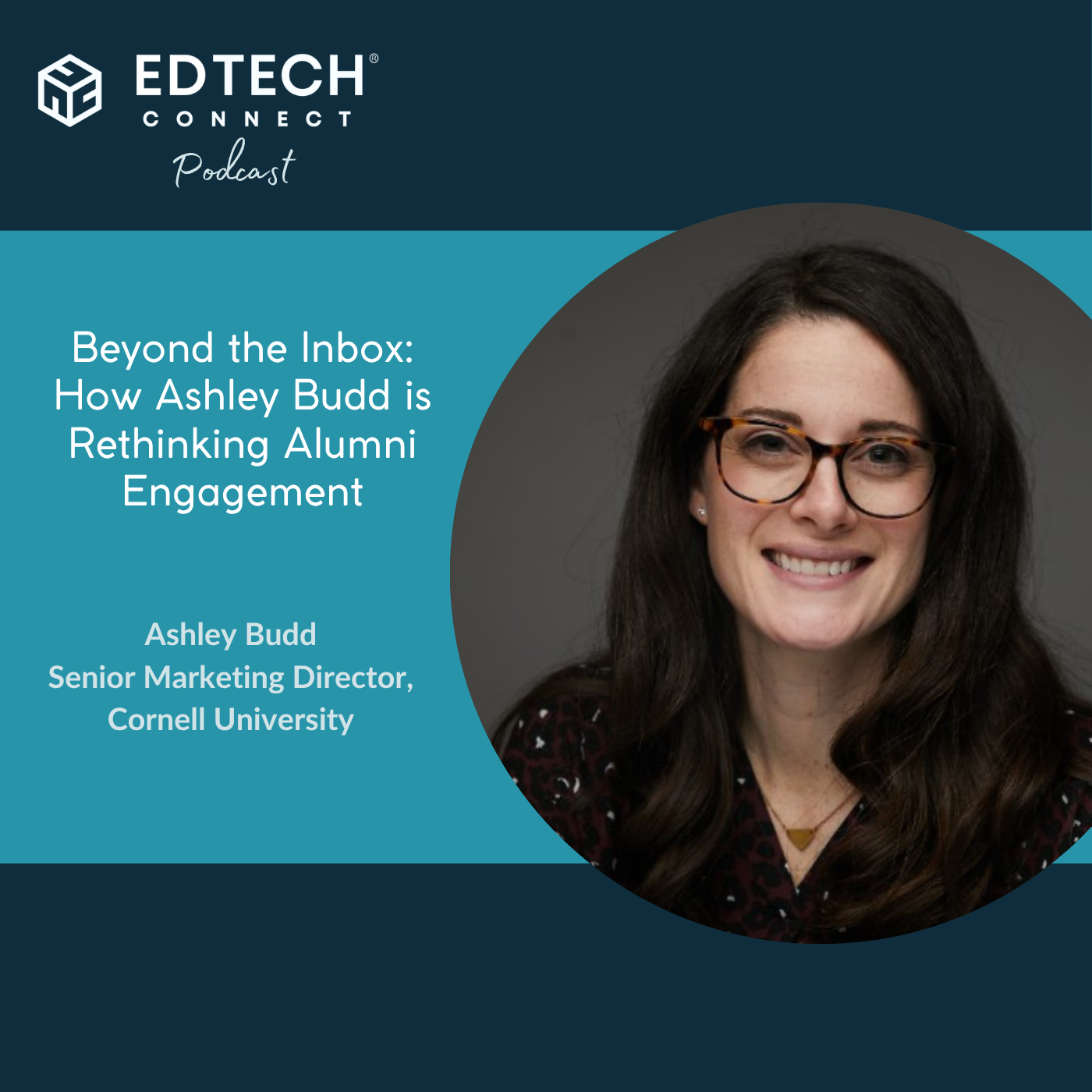Episode Transcript
[00:00:00] Speaker A: Higher ed. And by design, it's slow moving as an industry in that you want to make sure that, you know, give professors enough time to catch up with new technology, give students enough time. Give. Give enough time to learn the implications of any technology on learning before you adopt it full blown. So I feel like that's kind of where we are right now. We're in that learning phase. Okay, what is the ideal length of videos?
[00:00:36] Speaker B: Welcome to the Edtech Connect podcast, your source for exploring the cutting edge world of educational technology. I'm your host, Jeff Dillon, and I'm excited to bring you insights and inspiration from the brightest minds and innovators shaping the future of education. We'll dive into conversations with leading experts, educators, and solution providers who are transforming the learning landscape. Be sure to subscribe and leave a review on your favorite podcast platform so you don't miss an episode. So sit back, relax, and let's dive in.
[00:01:19] Speaker C: I am excited to introduce everybody to Vikram Chalana. Vikram is an accomplished engineer turned serial entrepreneur. Currently, he's spearheading victory, an innovative software company that leverages cutting edge artificial intelligence that empowers users to transform their messages into captivating video content quickly and effortlessly. Before founding Pictory, Vikram co founded Windshuttle, an enterprise software company specialized in specializing in SAP data management. Andrea's leadership, Windshuttle expanded globally to a team of over 300 people.
Vikram holds a bachelor's degree in electrical engineering from the prestigious Indian Institute of Technology and a PhD in engineering from the University of Washington, Seattle. Welcome, Vikram.
[00:02:10] Speaker A: Hey, thank you, Jeff. It's a pleasure. Thank you for the really nice introduction.
[00:02:14] Speaker C: Yeah, incredible bio. I'm excited to learn more about what you're doing, but first, I hear you went and climbed Kilimanjaro with your son. Any analogies building business there? Tell me about that trip.
[00:02:27] Speaker A: Yeah, I did last year around this time, we were up on Kilimanjaro, about 18 and a half thousand feet, and it was tough. It took about seven, eight days. And just like building a business, it was tough. The big lesson that I came back with was the importance of acclimatization.
So when you're doing high altitude climbing, right, you have to hike high and sleep low is the kind of the recommended thing. So. So you go up and then you come down, and then you have to spend a night there. Then you go up again, come down.
[00:03:03] Speaker C: I can see some analogies to business there. You know, it's not completely going up all the time.
[00:03:09] Speaker A: Absolutely, absolutely. And it's really that acclimatization is so important because otherwise you would crash and burn and you couldn't scale the market well.
[00:03:20] Speaker C: So, Vikram, tell me what Pictree is and what really inspired you to start this company.
[00:03:28] Speaker A: Yeah, absolutely. So what we're doing right now is using AI to help make videos, and make videos very easily. So the inspiration came from the idea that as I was doing my previous company, Windshuttle, one of the things I realized was that it's just like video was what everybody wanted, but videos were really hard for business people to create. You had to go to designers, you had to go to videographers, you had to go to people trained on these special software, like Adobe Premiere and Final cut pro. Sometimes you needed special machines to do that. And I tried picking up those things, and I, like, I gave up within a month of trying Adobe premiere. Like, the learning curve here is too steep, and I can learn. I did my PhD, but it was hard. Premiere was hard. So that was the inspiration is like, you know, can we make videos easy? When we started about five years ago, AI was just kind of starting to take off with all this NLP stuff. So we're like, okay, can we use AI to help make videos easy? And we saw what canva was doing around making design easy, and we said, okay, can we make, like, can we build a canva for video? And is kind of what.
[00:04:45] Speaker C: Oh, I liked that analogy. That makes a lot of sense to me. I love talking to companies who started with AI pandemic or pre pandemic, where before you couldn't really talk about. No one knew what you were really talking about. When you mentioned it, you kind of got a little head start. So it sounds like you're basically, is it fair to say, like micro learning using AI? Tell me some use cases for higher ed.
[00:05:10] Speaker A: In higher ed people, the way people are using it is in two ways. We have two core functionalities there. One is script to video. So you give us written script and say, convert that to a video for me. So that creates a short video, or it can create like a ten minute long video. But what, you know, what all the learning professionals know these days is four to five minutes is the ideal length of a video. So that's kind of the ideal length that trick to reproduces. So script to video is one core functionality, and people will use that as a supplemental learning material. These short videos, it could be vertical, it could be horizontal, it could be for whatever format you want. The second one is that you have a long lecture and you want to break it up into multiple chunks. You can either create a summarized version of that, or you can say, give me five different three minute clips from it. We have both these functionalities. You can either start with a recorded video or you can start with text. And either one, the end product is short videos that yeah, I love micro learning. It enables micro learning.
[00:06:28] Speaker C: So you've been doing this for a few years now.
How has the product evolved?
[00:06:33] Speaker A: Yeah, product has evolved significantly.
As you can imagine, when we started out, there was no GPT models, there was no chat GPD. So since the last year, since that came out of, we've incorporated a lot of that into the product and that has made things better, it has made things faster. And the other thing is we continuously add things that people ask us for and we're a very customer driven organization. So for example, in the beginning we added, we didn't have voiceovers like AI voiceovers. We added some basic voiceovers over time. And then in the last year or so we've had some incredible, very realistic sounding AI voiceovers from eleven labs that we've incorporated into our product.
So we consider ourselves like an almost an aggregator of AI technologies for the e learning industry and we're kind of putting it all together into one place. So we have that, we have eleven labs voices, we have summarizations that are provided by OpenAI, we have a big library of assets that we've licensed from Getty and story blocks that we bring into the. So it's just an aggregation of a bunch of tools and in a very easy user interface.
[00:08:00] Speaker C: I would think that when you're dealing with micro learning, with instructors, that the analytics behind the engagement of those videos is important. How far down the road are you with any sort of analytics with these little videos?
[00:08:13] Speaker A: We are still building it right now. We're counting on analytics that the LMS platforms are where these videos go, they provide analytics. So we're counting on those analytics. So we haven't built that ourselves, but it's certainly on our roadmap that makes sense.
[00:08:31] Speaker C: So have you learned how pictuream helps students learn more effectively? Is there, is there data out there that says micro learning is helping this way or do you have any research on that?
[00:08:45] Speaker A: Yeah, there's been ton of work done on that. I mean this four minute ideal video length comes from that, from that research that people are not going to engage with 40 minutes long lectures. In the beginning of the pandemic, as you know, everybody was, all the professors are putting their material as is like into their e learning systems and kids were not engaging. So there's a lot of research done at that point that, hey, this five minute, four, four to five minute increment videos are the ideal methodology. Then there's been a bunch of things around.
You've probably seen many of these teachers on YouTube who become kind of celebrities and they teach content, including things like Khan academy. And there is, you know, there's many things that people have learned about engagement, about changing scenes every so often, making sure there's movement, that, making sure that camera angle changes, all that kind of stuff. So there's been a bunch of things that, that we've learned and we're trying to add into our, into our platform to keep the engagement level high. And that's, that's, as you know, the name of the game is engagement here. How can you make people engage with the content?
[00:10:02] Speaker C: Totally agree.
What are the biggest challenges you faced to date? Would you say?
[00:10:13] Speaker A: Constantly building a startup is always challenging? And initially the challenges were like, okay, how do we get the word out? So kind of marketing and all that stuff. Then we had some viral moments, shall we say, right after chat, GPT came out and then we went from like 5000 monthly active users to 50,000 in a month.
And you have to manage all the website scale, infrastructure, everything, and still make sure people are having a good experience. And that seems to be a constant challenge for us. In the last 18 months is like right now we're doing about half, we get about half a million people every month on our platform. And so constantly having to scale the infrastructure to do that. And then the obvious, like the big challenge in any software, once it gets established is how do you introduce changes and new features and not break the existing workflows and not have a, give users a jarring experience.
[00:11:25] Speaker C: Sounds like the normal startup scalability challenges, the normal marketing, getting the word out with all the, I would say the noise out there with all the companies. So yeah, it sounds, I totally understand those challenges. Do you run into, I'm envisioning like really in the classroom, science related videos and things like that. When I've seen faculty and higher Ed maybe get demoed AI videos, they get a little, sometimes there's some fear about AI creating videos. You know, maybe there's an ethical concern or, you know, it's more, it's often more about a person talking and that's not really a person or something like that. Do you run into any issues about with just higher ed embracing AI yet? Have you been there?
[00:12:14] Speaker A: I think there may be ethical reasons why people don't embrace it. And I'll talk about both, because I think there is a legitimate fear about this deep fakes and misinformation and stuff that AI can create, and that's legitimate. And I think as AI companies, our responsibility is to make sure that you put all kinds of controls in your platform, do not allow that to happen. So that's one. The other thing is, I think, higher ed, and by design, it's slow moving as an industry in that you want to make sure that give professors enough time to catch up with new technology, give students enough time, give enough time to learn the implications of any technology on learning before you adopt it full blown. So I feel like that's kind of where we are right now. We're in that learning phase. Okay. What is the ideal length of videos? Are videos always the right way to teach? Are there combinations of things that simulations plus videos plus written material and that, so that. I'm sure there's a lot of research going on there, people studying it and figuring out what the right pedagogical methods are.
[00:13:37] Speaker C: Yeah, that makes sense.
Tell me about the model. You know, I've seen different ways companies do this. Sometimes I think a lot of these, maybe newer AI companies have a model where they go right to faculty and they'll have ed pricing or free trials. Sometimes it really is an enterprise, an enterprise system. What does the model look like at pictory for getting it into a classroom or a school at a university?
[00:14:02] Speaker A: We're still trying to discover that. And we have both the models. We have individual user pricing, and we have a lot of faculty members who use this. They just buy it on their own, and they're using it to create classroom content. And then we've had some universities where we've had their technology departments purchasing it for hundreds of faculty members.
And ideally, it needs to be bottoms up and top down both. And that's kind of how we're approaching it.
[00:14:37] Speaker C: You have to have both. It's great to see you're tackling it in both ways. It's almost like I've seen maybe a CIO say, hey, there's 20 of our faculty using this product. Maybe we should get a site license. It's a pretty good way to prove that, hey, our product is being used without much risk.
Well, that's. It's really interesting. I love to learn where you're going, what you're doing. Can you tell me who, if anyone, you could look back to that has inspired you on your founders journey?
[00:15:15] Speaker A: Yeah, different stages. Many different people inspire you. But I think there's a couple of names that I can think about that really for me, because I talked about the model company for us is canva, and, and the founders of Canva, Melanie Perkins and stuff. I think she's, she's very inspirational, both as a founder, as a design person, as kind of how she's scaled the business. And so I see them as an inspiration and particularly Melanie and then some of the other business leaders and in terms of how strategic they were in thinking, and particularly to me, Bill Gates and Satya Nadella, the guys at Microsoft, I mean, they've been inspirational.
Microsoft is having this third wind, if you will.
[00:16:06] Speaker C: And, yeah, they were, they are positioned pretty well, I think, in everything right now. Maybe they may have missed the boat in mobile, but they're not gonna, they're not gonna miss AI, it looks like.
[00:16:17] Speaker A: Yeah, absolutely. Yes.
[00:16:19] Speaker C: Well, I really appreciate having you on. Is there any last words you'd like to give our audience and let them know where to find you, Vikram?
[00:16:27] Speaker A: Yeah, absolutely. So our website is pictory AI, pretty easy to find, and I am pretty active on LinkedIn. So, Vikram, chalana, you find me on LinkedIn, and I'll be posting stuff about e learning and edtech and all kinds of stuff. And especially, especially videos. I'll be posting videos and how videos help.
[00:16:50] Speaker C: Perfect. Thank you. Shalom. Great having you.
[00:16:52] Speaker A: Great. Thank you, Jeff. It was a pleasure.
[00:17:04] Speaker B: As we wrap up this episode, remember, edtech Connect is your trusted companion on your journey to enhance education through technology. Whether you're looking to spark student engagement, refine edtech implementation strategies, or stay ahead of the curve in the emerging technologies, Edtech Connect brings you the insight you need. Be sure to subscribe on your favorite podcast platform so you never miss an inspiring and informative episode. And while you're there, please leave us a review. Your feedback fuels us to keep bringing you valuable content. For even more resources and connections, head over to edtechconnect.com comma, your hub for edtech reviews trends and solutions. Until next time, thanks for tuning in.


